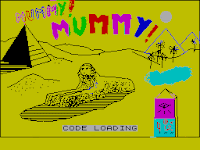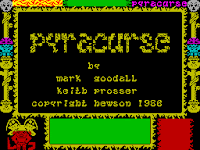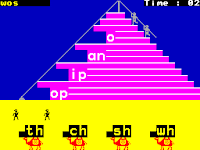It's been a while. Here's an question. In the GameBoy game Kid Icarus: Of Myths and Monsters (1992), why is an old man in a white robe and beard (bottom right) throwing triangles at you?
Sunday, 23 May 2010
Saturday, 15 March 2008
The 'pyramid base' of antiquity on home computers
The author of this blog occasionally casts a glad eye at ancient civilisations outside Greece and Rome. After all, we're all part of the same world, and many of the issues regarding ancient worlds in videogames are much the same regardless of cultural context.
Here are two arguments for why Egypt has fared so well as the subject of videogames, beyond the basic fact that almost everyone (especially under the age of 12) thinks mummies and crocodiles are cool. Egypt was very popular in the first computer games to enter the home - simple programs on machines like the Acorn, the BBC Micro, and successive versions of the ZX Spectrum. There are perhaps dozens of titles from the eighties, most of them simple maze or platform action games, others more puzzly.
Argument 1: a pyramid is triangular. A triangle is a simple shape (stop me if I'm going too fast). Simple shapes are easy to program, and easy to recognise. Therefore Egypt can very quickly be evoked through some yellow triangles, some palm trees and mummies, maybe some pretend hieroglyphics, and some beeps resembling the traditional 'Egyptian' tune now generally used for comic effect (I have no idea what it's called - Egyptian Reggae by Jonathan Richman sounds a bit like it).

Pyramid of Rameses (1987)

Mummy! Mummy! (1984)

Pyracurse (1986)
Pyramids (1987)
There's probably a family tree to be discovered here, but I'm too lazy (which is also why all of these examples are from ZXS games).
Argument 2 is of course the very fact that Egypt can be conjured up so easily by so very few signs. This is the advantage of taking on a culture without much of its own literature - everything has been hearsay, and becomes a cliche all too easily. I'm not sure which came first, Egypt's iconic simplicity or its massive dependence on the tourism trade - I think they create one another.
A later stage in this story is that there are literally hundreds of Egypt-themed games out there now - they've been streaming out for the last two decades - and far and away the majority are disposable puzzle-based tat (falling blocks, coloured gems, bubbles to match up, etc). It seems to be a law of nature that anyone who can write Flash games must at some point write a Pharaoh's Treasure or Pyramid Curse.
I think once upon a time some videogames player's ancestor must have desecrated a pyramid.
Friday, 14 March 2008
Legendary
Here's an interesting game well into production - Legendary: The Box (or simply Legendary).
From Wikipedia:'When tasked to break into a museum and steal Pandora's Box, master thief Charles Deckard inadvertently opens the box and unleashes evil on the world. In the process of opening the box, Deckard receives strange powers allowing him to defeat the creatures that have emerged in the aftermath of the box's opening. Using these powers Deckard fights alongside a clandestine organization against both the monsters that have been released and an occult group who seek to tap into the power of the box for their own selfish ends.'
The provocative reference to 'titans' in the publicity is probably a slip, but perhaps the giant monster made out of debris and wrecked vehicles is supposed to be a Titan. That would be great. As usual, the definition of 'legendary' is extended to include monsters such as griffins and werewolves which originated in antiquity, but only became popular much later. The gun-battle with a Minotaur is hilarious, so I recommend that, but here's the far more 'cinematic' trailer video, in all its sound and fury:
Unfortunately, this is a big-budget game and therefore covers well-worn ground. Shadowy urban locations full of rain and neon, plus a protagonist called Deckard? Sounds like Blade Runner to me. And the gameplay footage shows it to be yet another of the countless Gears Of War clones being churned out lately, which are all full of lantern-jawed squaddies in futuristic body-armour, milling around amid explosions, shouting things like 'Explosive shells - hell yeah' and 'Damn baby, I blew its legs off'.
Sad face.
Tuesday, 11 March 2008
Spartan: Total Warrior - Archimedes' speech in full
In 2005 there were two major releases of action games involving Spartan heroes who gain superhuman fighting skills through a pact with Ares and end up fighting him one-on-one. The other one is more famous, so let's feel sorry for Spartan: Total Warrior. Many things are interesting about this game, which plays hilariously fast and loose with classical myth and history, but here's something that I guarantee exists nowhere else on the internet (if it does, they pasted it from me). Transcribing it was laborious. I'm talking about Archimedes' Speech from the Athens segment of the game (before you power up his lightning gun).
In around 300BC, The Spartan, unnamed protagonist of the game, is travelling the world in a bid to save it from Tiberius and the evil Roman empire. He has come to Athens to support the resistance movement, led by the old but fearless inventor and political agitator, Archimedes. In the first part of this sequence, Archimedes stands in the town square (forum? agora?) and delivers a long speech to the population. The Spartan's task is to rush about killing snipers and assassins in order to keep Archimedes alive and safe, but if you stop and listen, you get a superb example of 'Greece versus Rome' stereotyping, with evidence that the writers did their homework (or at least kept it from when they were at primary school). Here's the looped monologue in full - it's pretty good rhetoric, and I love the fact that Archimedes quotes himself:
'The Roman dogs that besieged our city have now entered our sacred streets. Our liberty is under threat, and our culture is no longer safe from those brutal Roman invaders. Today, every Athenian man, woman and child must stand up to face our greatest foe and defend our city and our ideals. These Roman aggressors shall not crush our hallowed nation of learned art and wisdom. For I say to you this day, we will fight these tyrants with all our strength. We must stand united against our enemy, or risk losing all that we have achieved. These marching military men are not content simply to occupy our city. They will crush our knowledge and bury our thoughts. Can we live like barbarians, mired in ignorance and stupidity? No! We are Athenians! I will humble myself before this nation of natural leaders, and offer myself as a figurehead for our greatest struggle! I may be old, and my corporeal presence diminishing, but my mind remains as sharp as ever. Remember that I discovered the secret of enticing water to flow uphill! Now my invention, the screw, is used throughout the civilised world to turn the very tide. The time has come for us to stem the flow of the Romans, and force them to turn around, and surge upstream, back where they came from. We can take back our great city, and return her to her rightful rulers. The people of Syracuse have called upon my skills, and I have created war machines for their defence. My inventions, combined with the resolve of the people, will save us all. We will scupper their ships with my claw, and burn their bodies with the brilliant rays of Helios! We can win this battle – we will win this battle! Hear the words of the great geometer: ‘Give me a lever and a place to stand, and I can single-handedly move the world’. We have the power to stand firm in our place and move the world the way we want. I am as certain of our victory as I am certain of the movement of the heavens around us. I tell you this, Archimedes and my fellow Athenians will not be enslaved, nor die at the hands of these imperialist Roman dogs! Solidarity, my brothers and sisters! Solidarity! Heed my words and act on my message! I say to you again: The Roman dogs…'
Thursday, 6 March 2008
Classical Names, Unclassical Games
A number of computer games have had classical-sounding names but completely different content. There are lots of reasons for this. For example, fantasy games are often borderline classical-mythical anyway, and classical cultural references are arty and stylish and 'mature'. So Asheron's Call sounds like Acheron, one of the rivers of the Greek underworld; Dirge of Cerberus is a vaguely intellectual and Gothic-sounding title for a Final Fantasy game; and Via Domus, being Latin, is sufficiently cryptic (but not too cryptic) to be the title of a game based on the TV series Lost.
But here are three reasons for games to have nothing to do with Classics beyond the title, with a selection of the many examples of each.
1) Greek and Latin are spacey. The first five years of arcade games were predominantly spaceship shooting games, and the sci-fi nerds still enjoy a large slice of the market. Games therefore have titles designed to evoke planets, spaceships and other astronomical things named after classical mythology, especially all those eighties Space Invaders rip-offs.
Examples:
Andromeda (ARC: 1981)
Arcadia (ZXS 16K: 1982)
Arcadians (Acorn Electron, BBC Micro: 1982)
Argonaut (Amiga: 1992)
Cerberus (ARC: 1985)
Darius (ARC: 1986)
Erebus (Amstrad, C64: 1986)
Hades Nebula
Juno First (ARC: 1983)
Mars (ARC: 1981)
Pleiads (ARC: 1981)
Pollux (ARC: 1991)
Regulus (ARC: 1983)
2) Geometry and Arithmetic are Greek. The sad truth is that all of the fun of video games is based on maths (i.e. programming), and this was even more obvious in the days when games were often single-authored pet projects. A few puzzle games refer explicitly to the maths basis of both their gameplay and their design, presumably to imply that they are for intelligent players. One of my burning desires is to understand the place of Classics in Japanese culture. It's remarkable how many games with names from classical science were initially made and marketed in Japan.
Examples:
Archimedes’ Screw (ZXS 48K: 1983)
Gigas (ARC: 1986)
Palamedes (ARC: 1990)
Riddle of Pythagoras (ARC: 1987)
(Archimedes' Screw is a special case, since the coding of the game, when mapped visually, is shaped like the object after which it is named. Meta!)
3) Antiquity has the best heroes. A fighter whose present or past adventures are synonymous with Western civilisation is bound to make people want to play the game. At least, this must be what marketers are thinking when they give the names of classical heroes and warriors to entirely unclassical characters. Sometimes this is done only for the Western audience - but not always.
Examples:
Ares (ZXS 48K: 1990)
Ares No Tsubasa – The Legendary Soldiers (JP)/Legendary Wings (US)
Argos no Senshi – Legendary Warrior (JP)/Rygar – The Legendary Warrior (US) (ARC: 1986)
Legionnaire (ARC: 1992)
Odyssey: The Legend of Nemesis (MAC: 1996)
Soldier Girl Amazon (US)/Sei Senshi Atalass (JP) (ARC: 1986)
Spartan X (JP)/Kung Fu Master (US) (ARC: 1984)
Tantalus (ZXS 48K: 1986)
Trojan (US)/Tatakai no Banka [War Elegy] (JP) (ARC, PC: 1986)
Wednesday, 5 March 2008
God of War story arc
To prove that I do recent mainstream games as well as obscure retro and abortive ones, here is the first of many posts on the crucial God of War series, arguably the most significant classically-themed videogames franchise so far. The latest instalment comes out in a couple of weeks - see below.

Kratos, the Spartan general, dedicates himself to Ares in order to gain glory in battle. The resulting massacre includes his wife and child. After a long quest to challenge Ares and gain vengeance, during which he retrieves Pandora's Box, and is also killed and returns from the underworld, he kills Ares in single combat and becomes the new God of War.

God of War III (PS3: forthcoming 2009?)
Wednesday, 27 February 2008
Gods (Bitmap Brothers game)

Gods is an unusual title, in both senses. Its look is classic Bitmap Brothers - solid, shiny metallic sprites, firepower that soon becomes a meaningless blizzard, and quirky new interpretations of videogame steretypes. Back in 1991, platform games didn't need to be novel to go down well, but the tantalising classical elements to the plot may help to explain how it stormed across every available platform. The avatar, who may or may not be Hercules (that catch-all mythical hero), has entered the domain of the gods in order to challenge their power. He fights through four worlds entitled City, Temple, Labyrinth and Underworld. Here's the manual text in full. It sounds post-apocalyptic or high-fantasy barbarian (for a decade, all Western-style warriors were Conan the Barbarian clones), but note the coy ambiguousness. Timeless means absolute; this is one way to achieve the videogame-hero imperative of making the player's actions the focus of the entire game-world's attention.
The avatar, who may or may not be Hercules (that catch-all mythical hero), has entered the domain of the gods in order to challenge their power. He fights through four worlds entitled City, Temple, Labyrinth and Underworld. Here's the manual text in full. It sounds post-apocalyptic or high-fantasy barbarian (for a decade, all Western-style warriors were Conan the Barbarian clones), but note the coy ambiguousness. Timeless means absolute; this is one way to achieve the videogame-hero imperative of making the player's actions the focus of the entire game-world's attention.
From the SNES manual: 
A city lost in legend
An unconquered warrior seeking reward
A challenge laid down by the Gods
The greatest prize of all - immortality
4 great events combine to bring forth a burning legend
Relive that legend
Who would have thought that a man would be so foolish or so daring as to accept a challenge set down by the Gods? And yet one came forward to claim the right to test his skills and strengths against a city so legendary its name alone struck fear in the hearts of all who heard it spoken.
Firstly, let us talk of this city.
None can be sure that the city even exists for no one has ever seen it. It was build by the Gods, a plaything, great temples, hidden underworlds, fiendish labyrinths and soaring towers. It is a city stolen by the forces of darkness, the abode of nightmare hosts, the dwelling of fearsome monsters, the dominion of four great guardians.
Secondly, who is the hero?
Has anyone matched him in battle? No. Has he ever turned aside from his sole quest? Never. Is he not therefore a hero among heroes? Undoubtedly.
In his travels our warrior has become skilled in all the weapons of war; he is strong and unflinching. What of all the prizes of the world does he seek? He wishes to join those fickle masters of the human race - the Gods themselves.
Thirdly, I shall recount the challenge of the Gods. Were the Gods only joking when they laid their challenge? Uncaring and unthinking on Mount Olympus, they thought that no one would hear their rash words.
Any man may earn through skill and courage a single favor of the Gods, if he will face the fear of the ancient city and slay the four great guardians who have stolen our citadel from us.
Through their contempt for man did they not bring about their own undoing? For never before had such an untamed reward been offered to the mortals. But who from the ranks of man would face destruction at such odds? Surely none.
Only One.
Finally, what did the hero ask of the Gods. 
Immortality breeds contempt and the Gods, so long uncaring for the events of man, know nothing of the exploits of our hero. He stands before them showing neither fear nor disdain and asks the Gods that should he return, fulfilling completely their quest, he will join them as an equal and a brother.
The horror, the impertinence, the mistake realized too late, the gateway lies open to their domain where no mortal man has ever trod before.
But the world of the Gods may not be broken and only the hope of the hero's failure comforts them as the warrior departs for the City of Legends, preparing to carve one more story on its walls...



